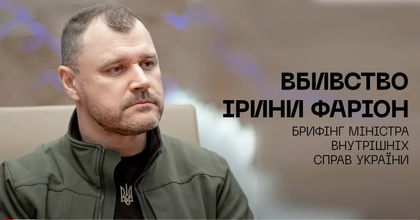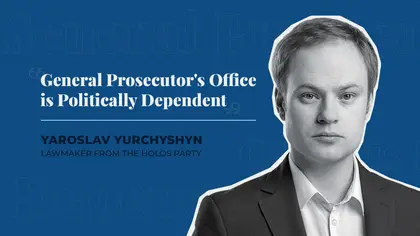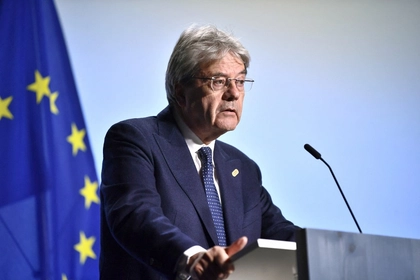In an exclusive interview with Kyiv Post, a lawmaker from the Holos party, Yaroslav Yurchyshyn, Deputy Chairman of the Anti-Corruption Policy Committee, pointed out that twelve lawmakers from the pro-Russian party have already lost their seats in the Verkhovna Rada (Ukrainian Parliament). Yurchyshyn said that anti-corruption infrastructure is working efficiently during wartime, but the Prosecutor General's office is still politically dependent due to its leadership selection process. He also commented on corruption scandals in the Ministry of Defense (MoD) and the cases of technocrats Andriy Kobolev and Andriy Pyvovarsky.
Do pro-Russian lawmakers still have influence in the Ukrainian Parliament?
After full-scale aggression, their influence has been minimized. There is higher unity in the Parliament than before due to the war. Many of pro-Russian lawmakers lost their seats - 12 of them are not members of Parliament anymore.
The pro-Russian lawmakers were eliminated in two ways: by losing Ukrainian citizenship or by resigning. This is a largest loss of seats in the history of the Ukrainian Parliament.
Still, a lot of pro-Russian members remain. Including some who fled abroad in February last year when the full-scale invasion started.
We are currently working on a constitutional way to forbid pro-Russian parties in the future. There are 11 or 12 pro-Russian parties in Ukraine.
Russia has occupied a large amount of our territory and caused a lot of Ukrainians to suffer. There must be at least political repurcussions for that.

Farion’s Killer Prepared Disguises, Had Another Victim in His Sights, Interior Minister Says
What about Nestor Shufrych, the most active representative of pro-Russian politicians? Is he still heading the Committee on Freedom of Speech and Information Policy in Parliament?
It's a pity, but yes. I hope this situation will be resolved in the future.
Maybe it was magic: in an instant he became pro-European, pro-Western, and pro-democratic after the full-scale invasion. Something happened to him. Perhaps he is scared.
I remember that he was arrested at the beginning of the full-scale war. He is often a spokesman of the pro-Russian party "Platform for Life and Peace" in Parliament. I think we will solve this problem. There are several proposals for dismissing him as the head of this committee.
However, regulating the media is not within this committee’s responsibility. I think his appointment in the past was made to give his party a formal position, but not one that was influential.
Still, for society, it is a bad sign that someone who had, or I am sure, still has a pro-Russian position is heading a committee in the Parliament.
You are in charge of the Anti-Corruption Committee. Can you comment on the recent corruption scandals in the Ministry of Defense?
It is not a new problem for Ukraine. We have had problems with supplying food and goods to the soldiers before. It's a post-Soviet-Union tradition that all information regarding army purchases is kept secret and because of this we lack suppliers.
Of course, many big retailers on the market can participate in the tenders for supplying products to the army. But many are not interested because the purchasing process is not transparent and there are some corrupt mechanisms involved. This is the result of secrecy in this area.
According to NATO standards, only three types of information are secret - technology, army locations, and communications. In Ukraine, we have the NGO National Anti-Corruption Committee in the sphere of defense that, even before the full-scale war, proposed making information about food supply to the army transparent. However, the MoD refused.
I agree with the Minister of Defense, Oleksy Reznikov, who said it is not a priority right now due to the war. However, it is very criticalf or our citizens and international partners. We must show that the defense sphere is under control and that no corruption exists. That’s why the MoD established a special anti-corruption council to change public procurement procedures.
For me, a good example was in the Ministry for Communities, Territories, and Infrastructure. When the journalists and enforcement agencies raised awareness about possible corruption, all officials potentially involved were dismissed.
I think it's a good precedent in Ukrainian history because usually a suspected person still holding their position can influence an investigation. In this case the deputy minister, head of the department and other employees were dismissed.
Why are investigative journalists initiating corruption cases in Ukraine? How do you assess the work of the anti-corruption infrastructure in wartime? Is it effective?
Usually, the most significant corruption cases are initiated by investigative journalists. In particular, the situation with law enforcement agencies in Italy received information about the mafia from investigative journalists. Of course, this didn’t bring a conviction directly, but it helped provide more flexibility and more effectiveness at the beginning of the investigation.
Regarding our anti-corruption infrastructure, I am quite happy with their work, even in wartime. After the appointment of special anti-corruption prosecutor Oleksandr Klymenko [in June 2022], we have a fully working system.
There are 112 verdicts on high-level corrupt officials. In particular, convicted the lawmaker Oleksandr Trukhin, a member of the Parliament's majority - this is a unique situation for Ukraine. Also, convicted were former deputy minister Yuriy Hrymchak and many former prosecutors and judges. Before the Revolution of Dignity in 2014, this was completely impossible.
Some of these investigations are sensitive and have raised many questions. It is a very sensitive area. For example, when investigators visited the house of Joe Biden or Christine Lagarde, it started some tough discussions in the American public. After all, Joe Biden is a US President, and Christine Lagarde heads the IMF. They are expected to follow the rule of law.
Of course, we have work to do. In particular, there are many requests from the special anti-corruption prosecutor's office for the extradition of many people who escaped the county. However, not all requests have been signed by the Prosecutor General. It is very sensitive.
Why? Are the prosecutors afraid or corrupt?
I couldn't say that the Prosecutor General's office is corrupt, but they are politically dependent. This is happening because of the procedure for the appointments. There is competition for the head of the Specialized Anti-Corruption Prosecutors Office (SAPO) and for the head of the National Anti-corruption Bureau of Ukraine (NABU), and even for judges.
The President and Government only appoint the selected independent commission candidates. However, for the Prosecutor General's office, the President proposes the candidate and the majority in the Parliament confirms them by vote. This means lawmakers could become heads of the Prosecutor General's office in a conflict of interests.
So, I couldn't confirm corruption, but I can say there is political dependence in some cases, and politically dependent decisions by the Prosecutor General's office.
Is the newly appointed head of the anti-corruption agency also politically dependent?
We have an effective and competitive selection procedure for this position.
Suppose the newly appointed head of the anti-corruption agency Semen Kryvonos chooses to be “politically convenient” for the government. If that turns out to be the case, it will create some obstacles but will not stop the anti-corruption agency's work.
In a previous situation, Nazar Kholodnytsky, former head of the SAPO - who was “politically convenient” - was dismissed
The SAPO opened cases against two technocrats -former Naftogaz CEO Andriy Kobolyev and former Minister Anrdiy Pyvovarsky. This caused public criticism. Could you comment on this?
Referring back to the example of Joe Biden and Christine Lagarde - there is the same situation. I don't think that NABU and SAPO are attacking corporate governance reform and that technocrats are a priority for enforcement agencies. Only the courts can say whether they are guilty if there are some suspicions about technocrats.
The official salaries of state officials are quite low in Ukraine, and the Minister usually approves bonuses for his team and himself. Could this also prompt investigations by NABU and SAPO?
It is inappropriate for enforcement agencies because these institutions have high salaries without any bonuses. In ministries and state companies, we need to have the same system.
Do I understand correctly that every Minister could be convicted?
Yes. We have a populist regulation that limits the level of bonuses. Kobolev knew about this regulation. In 2017 the supervisory board of Naftogaz took this regulation into account, and the next year they did not. If the supervisory board explains why they decided to pay a higher bonus amount to Kobolev, the enforcement agencies will not have any questions.
What are the priorities for the Anti-Corruption Committee's work? What are the most corrupt entities in Ukraine?
It’s hard to say what is most corrupt. I would say the most regulated and, due to that, most problematic are customs, fiscal services, and all resource-related agencies.
Is your committee working to improve the situation?
Yes, we created a special investigative commission under our control. Also, we are responsible for fighting against Russian economic influence.
However, our primary responsibility is to help the anti-corruption infrastructure to show the appropriate results. It is a direct request of the Ukrainian people that we will be stronger after the war.
We must obtain a victory in the war against corruption. Combating corruption is also of primary importance to our international partners because they plan to fund the rebuilding of Ukraine after the war. Last but not least, it's a requirement of businesses that will invest in Ukraine.
We must provide clear and transparent rules that will decrease investment risks. I see that we are moving towards establishing these clear rules.
There are problems with customs and fiscal services, but we are working to solve them. Euro Integration has allowed Ukraine to adopt many western regulations in the anti-corruption sector that are effective.
You can also highlight the text and press Ctrl + Enter






